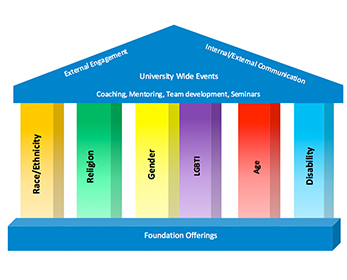Offerings in each pillar are scaffolded to provide a growing understanding and depth.
Offerings are presented in three levels: General, Specific, and Advanced.
General
‘General’ level offerings in each pillar offer an introduction into that area of diversity, with the opportunity to;
- Define one’s identity in relation to cultural and social differences
- Examine how personal beliefs and behaviours affect students, colleagues, and interpersonal interactions in a multicultural environment.
Specific
‘Specific’ level offerings present a more in depth look into each diversity area and provide staff with the opportunity to;
- Explore specific issues related to each diversity pillar
- Gain specific skills related to each diversity pillar
- Examine how to convert knowledge and information into usable skills and new behaviours when managing diversity
- lead by example in fostering a culture where discrimination is unacceptable and not tolerated
- incorporate workplace diversity principles into team and management practices.
Advanced
‘Advanced’ offerings require staff to examine how they work with a diverse cohort of colleagues and students. Skills level sessions provide staff with the opportunity to;
- Examine how to convert knowledge and information into usable skills and new behaviours when managing diversity
- lead by example in fostering a culture where discrimination is unacceptable and not tolerated
- incorporate workplace diversity principles into team and management practices.
